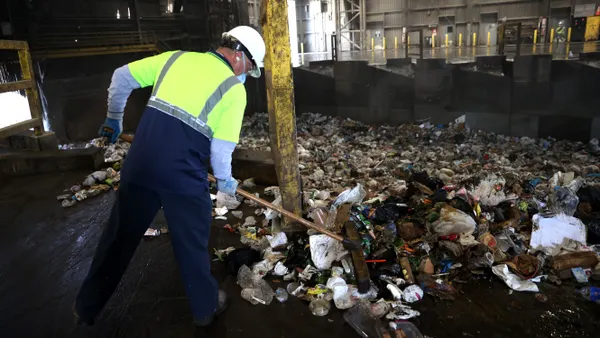Over the course of a few years, Republic Services is spending more than a billion dollars in capital investments and operational expenditures on digital solutions, CEO Jon Vander Ark said at WasteExpo's Investor Summit on May 5. He said that's giving the company a leg up.
"That is a scale difference and scale benefit that only a small number of players can just physically do given the size of their business and scale of their business," Vander Ark said. "We're going to make it effortless to do business with us."
New technologies fueled by robotics and artificial intelligence have reshaped certain aspects of the waste and recycling industry in recent years, including in MRFs and increasingly along collection routes. But executives have to be clear-eyed about which technologies are overhyped and which can deliver measurable returns on investment, Vander Ark said.
He compared the current boom in AI investment to the "dot-com era" of the late 1990s. He noted that many companies that chased a digital footprint suffered in the 2000 market contraction, but the push to bring brands online "had tremendous and profound impact" more than 20 years later.
"I think AI is on a very similar path,” Vander Ark said. "I'm not a huge AI person in the sense of, I think it is wildly oversold in terms of the timing of the impact."
For a vertically integrated waste company like Republic, though, there are select applications that Vander Ark sees as beneficial to the bottom line. He said the company is currently looking at taking out repetitive back-office tasks and replacing some human customer service work with AI.
Republic has also been investing heavily in digital efficiencies for its fleet. The company has nearly completed an initiative to put tablets in the cabin of each hauling vehicle connected to its "RISE" dispatch platform.
On the company's Q4 2024 earnings call, executives reported RISE had generated more than $60 million in revenue in its first year of operation. The company's adoption of the MPower system, which would automate fleet maintenance tracking, is also expected to save another $20 million in revenue annually once fully online by the end of 2025.
At the Investor Summit, CFO Brian DelGhiaccio said that Republic could save $5 million per year for every one minute saved across its fleet's routes. Republic has advised it can achieve another $30 million in savings through its digital initiatives, but Vander Ark said that's a conservative estimate. With AI, he anticipates further savings through route optimization.
For instance, he noted large container routes typically require picking up waste from a customer, going to a landfill or transfer station, and then going back out. But there may be ways to use AI to create "point-to-point-to-point" routes that are more efficient and take out legs of a vehicle's journey, he noted.
Executives also said drivers are in favor of identifying more route efficiencies.
"They want that information at their fingertips. They don't want to experience the inefficiencies of, let's say, a traffic jam," DelGhiaccio said. "They'd rather know about that in advance and reroute to make sure that they can be more efficient and get home quicker to their family and finish their routes."
Vander Ark was also bearish on the prospect of autonomous hauling vehicles removing the need for drivers, saying that was likely still 50 years away. He said that was because drivers today aren't just maneuvering the vehicle but are overseeing a complex series of tasks.
Larson Richardson, senior vice president of operations, said technology in fleets "doesn't replace the need for leadership from an individual."
"Technology enables them to have autonomy over their route, but there's certainly elements in their route that requires the athlete behind the steering wheel of the truck to operate in an efficient and effective way," he added.
Disclosure: Informa, which owns a controlling stake in Informa TechTarget, the publisher behind Waste Dive, is also the owner of WasteExpo. Informa has no influence over Waste Dive’s coverage.












